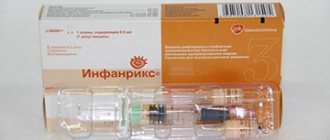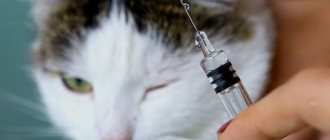In 2014, according to Rosstat, 95.6% of newborns were vaccinated against tuberculosis (in 2013 it was also 95.6%); 96.5% (in 2013 - 97.3%) of children under one year of age were vaccinated against diphtheria, 96.3% (in 2013 - 96.9%) - against whooping cough, 97.6% (in 2013 - 97.6%) - from polio; 97.8% (in 2013 - 98.1%) of children under two years of age were vaccinated against measles, 98.1% (in 2013 - 98.1%) - against mumps.
According to Rospotrebnadzor, in 2015, 95.8% of newborns were immunized against tuberculosis, and 97.4% of children under one year of age were immunized against polio; 97% of children received three vaccinations against viral hepatitis B upon reaching one year of age (in 2014 - 96.6%, in 2013 - 97.3%); from whooping cough - 96.8% of children aged one year and 96.42% of children aged two years.
In recent years, the number of Russians receiving flu vaccinations has increased significantly. If in 1996 there were 4.9 million, then by the beginning of the 2015-2016 epidemic season. 44.92 million people were vaccinated (31.3% of the total population of the Russian Federation). On the eve of the autumn-winter season 2015-2016. More than 13.3 million children were immunized (47.6% of the total child population under 17 years of age).
Complications from vaccination
Accounting and control over the number of complications as a result of vaccination has been carried out only since 1998. Such work is carried out by national specialized scientific institutes, but they study the situation only in a limited number of settlements, mainly in large cities. There are no general official statistics on complications and deaths after vaccinations in Russia. Along with this, over the past 50 years, experts have observed an increase in complications from the BCG (against tuberculosis) and DTP (adsorbed pertussis-diphtheria-tetanus) vaccines. According to medical statistics, approximately 500 people in Russia have an acute reaction to vaccination every year.
In 2015, the Federal Service for Healthcare Surveillance (Roszdravnadzor) identified 172 cases of adverse reactions and complications when using vaccines in 38 Russian regions (including Moscow and St. Petersburg). Including 61 cases when using an inactivated vaccine to prevent influenza, 35 cases - vaccines to prevent viral hepatitis B, diphtheria, whooping cough and tetanus, 18 cases - vaccines to prevent pneumococcal infection, 10 cases - vaccines to prevent tuberculosis, 9 cases - vaccines for the prevention of polio, 7 cases - vaccines for the prevention of viral hepatitis B.
Basic provisions
Preventive vaccinations according to epidemic indications are carried out to citizens when there is a threat of infectious diseases, which are determined by a special list. The decision to carry out such vaccination is made by the chief state sanitary doctor of the country and the chief sanitary doctors in the regions. Vaccinations are given in medical organizations that have a special license to carry out immunoprophylaxis of this kind. Moreover, only employees who have undergone special training in the use of immunobiological drugs to prevent infectious diseases can be vaccinated. They are also additionally familiarized with the nuances of vaccination and are aware of all the intricacies of providing first aid in an emergency or urgent situation.
Vaccinations for epidemiological indications, which are provided for by the national calendar, must be registered taking into account the nuances of Russian legislation and instructions for their use.
To everyone who is going to receive such preventive vaccinations, doctors explain the need for immunoprophylaxis, and also describe the possible consequences and reactions. Naturally, before receiving the vaccine, a person must be examined by a doctor.
Interrupted course. Is it possible to violate the vaccination schedule? More details
Cases of vaccination complications since 2010
In December 2010, a 5-month-old girl died in Omsk the day after being vaccinated against hepatitis and polio. The child's death occurred as a result of acute respiratory failure.
In May 2010, law enforcement agencies in the Amur region began investigating the causes of death of a 1.5-year-old girl who died after being vaccinated against polio. The official cause of death is hemolyticouremic syndrome.
In April 2010, in the Yaroslavl region, 70 children and 10 adults consulted doctors after being vaccinated against tick-borne encephalitis.
In January 2012, a one-month-old girl died in Khakassia on the second day after being vaccinated against hepatitis B.
On September 18, 2013, students of a secondary school in the village of Melekhino, Berdyuzhsky district, Tyumen region, were vaccinated against tularemia. The next day, due to deteriorating health, 33 children were hospitalized in the regional hospital.
On October 7, 2013, a pediatrician and a nurse from the Yakovlevsk Central District Hospital of the Primorsky Territory conducted tuberculin diagnostics for 45 schoolchildren in the village of Novosysoevka. The vaccine was administered without the consent and notification of the schoolchildren's parents. At the same time, the permissible doses of the drug were exceeded by 2.5 thousand times. As a result, 28 children were hospitalized, of which 11 schoolchildren were sent for examination to Moscow. Based on the fact of the children’s illness, a criminal case was initiated under Art. Criminal Code of the Russian Federation “negligence”.
In December 2015, in one of the secondary schools in the city of Bezhetsk, Tver Region, a medical assistant, while conducting a Mantoux tuberculin test, mistakenly administered an anti-tularemia vaccine (live dry) to 10 11th grade students intradermally into the left forearm. As a result of an adverse reaction to the drug, the teenagers were hospitalized.
In August 2021, a post-infectious abscess was caused by a vaccination against diphtheria, whooping cough and tetanus (DPT vaccine) given to three children at the Verkhnedubrovsk outpatient clinic in the Sverdlovsk region.
Coronavirus after vaccination: truth, myths and doctors’ opinions
Now among those hospitalized in St. Petersburg infectious diseases hospitals, literally dozens of people are vaccinated, but not hundreds. Taking into account the fact that today in St. Petersburg we have crossed the threshold of 700 thousand people being vaccinated (with the first component - ed.), their number is insignificant. But it is not clear how the disease would progress in people without vaccination. There might have been more serious consequences. In St. Petersburg, there are also cases of repeated coronavirus disease, which suggests that a person’s own immunity does not always protect against the disease.
In any case, if we talk about the risk/benefit ratio of vaccination, then vaccination today is a clear guarantee that the vaccinated person will either not get sick or get sick, but not in a severe form. The fact that after a vaccine there cannot be a severe form of the disease - a condition when a person is connected to a ventilator or death follows - has been proven at the world level. The medical community came to this conclusion after analyzing data on vaccinations against coronavirus and other diseases.
Read on RBC Pro
The Great Dismissal: Why Russia is Expecting a Mass Exodus of Employees
Get out of here: why top managers in Russia can’t find work
What is important to know about the unfolding energy crisis in Europe
Will the collapse of China's largest developer be the beginning of a global crisis?
I will give one more argument in favor of vaccination. There are people prone to autoimmune diseases. Let’s say a person periodically has joint pain, but this does not prompt him to go to the doctor, analyze rheumatoid factors, etc. But in fact, he may have an autoimmune disease to one degree or another. When contracting COVID-19, there is a high probability of the disease progressing with a hyperreaction (an aggressive immune response that can lead to death - ed.). But the person didn’t know about this, he thought that without vaccination he would easily get over the coronavirus.”
Lev Averbakh, chief physician of the private emergency medical service “Coris”:
“There are cases of hospitalization with coronavirus after vaccination - and this is not surprising. By the fall, the number of COVID-19 cases with vaccination in St. Petersburg may reach 50 thousand people and this is absolutely normal! Because now about 550 thousand people in St. Petersburg have been fully vaccinated. If we take the 8-10% for whom the vaccine does not work (vaccine manufacturers claim this figure), then this is exactly the figure we get. You need to understand that “Covid” with vaccination is not a general story.
The vaccine helps 92-94% of those vaccinated and 6-10% does not help. Some people get sick because they simply haven't had time to develop immunity after being vaccinated. This is a long story - it takes 21 days for antibodies to form after the first vaccine, then another 21 days after the second injection, and only then after some time does immunity appear. It turns out that there are about two months when a vaccinated person can catch the infection. There are people who get sick after being vaccinated with two components.
Both the vaccine manufacturer, the Ministry of Health, and Rospotrebnadzor say that vaccinated people must follow the same anti-epidemic regime as unvaccinated people - wear masks, avoid close contacts indoors. This indirectly suggests that anyone vaccinated can get sick - and it is not clear who exactly. There is no way to calculate this.
At the same time, it is incorrect to say that if a person has been vaccinated, then he will definitely not get a severe form of coronavirus or die from the disease. No such relationship has been established. After a person becomes infected, the disease develops in its own way in his body.
I would like to note that throughout history, vaccinations have never led to 100% immunization of the entire population. There have always been cases when the vaccine did not work on a person or he did not receive the strength of immunity to resist infection. Also in world history there are opposite cases. Bubonic plague is fatal, but we know of cases where people have overcome this disease. The same rabies is a 100% fatal disease, but there are three cases in history when people survived without vaccination. Everyone's body is different - and vaccines affect us differently, just as we tolerate diseases differently.
When asked whether it is necessary to get vaccinated if you can still get sick, opinions vary. I would advise anyone who is looking for an answer to this to turn to Federal Law 323 “On the fundamentals of protecting the health of citizens in the Russian Federation,” which states that everyone voluntarily makes a decision about medical intervention, having received complete and reliable information about it. I recommend that St. Petersburg residents first of all get complete information about their health and, based on it, decide for themselves whether to get vaccinated against coronavirus.”
The opinions of the speakers may not coincide with the position of the editors
Reference
Today, St. Petersburg residents can choose three vaccines for vaccination against coronavirus: Sputnik V, EpiVacCorona and CoviVac. RBC St. Petersburg wrote in detail about the difference between these vaccines. As of June 2, 3,058 people in St. Petersburg completed the first phase of vaccination with CoviVac. 20,359 people were initially vaccinated with the EpiVacCorona vaccine, and 11,323 people completed the vaccination cycle with this drug. 676,961 people were vaccinated with the GamCovidVac (Sputnik V) vaccine with the first component, of which 569,088 people completed the vaccination cycle.
Material from 06/03/2021 updated 06/19/2021
Prepared by: Victoria Saitova
The issue of introducing compulsory vaccination of children
Recently, WHO has become concerned that parents have begun to refuse to immunize their children. The problem is relevant for the whole world, including Russia.
In April 2021, Deputy Head of the Ministry of Health of Tatarstan Farida Yarkaeva reported that the republic was considering introducing compulsory vaccination for children without the right of refusal.
In May 2021, the children's ombudsman of the Yamalo-Nenets Autonomous Okrug, Vitaly Oreshkin, spoke out against the suspension of students from classes due to the lack of a Mantoux test. In his opinion, parents have the right to refuse tuberculin diagnostics.
On August 7, 2021, the head of Rospotrebnadzor Anna Popova stated that the possibility of introducing legal liability for parents for refusing to vaccinate their children is currently being considered.








